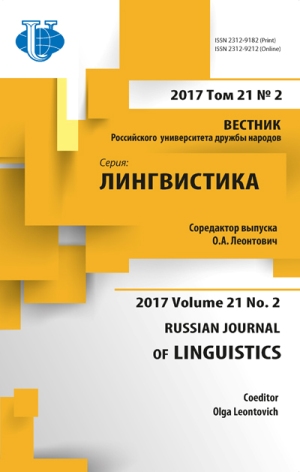Discursive functions of Japanese Personal Pronouns
- Authors: Oishi E.1
-
Affiliations:
- Tokyo University of Science
- Issue: Vol 21, No 2 (2017)
- Pages: 305-319
- Section: Articles
- URL: https://journals.rudn.ru/linguistics/article/view/15899
- DOI: https://doi.org/10.22363/2312-9182-2017-21-2-305-319
- ID: 15899
Cite item
Full Text
Abstract
The first-person pronoun “I” refers to a particular individual as the speaker producing an utterance, and second-person “you” refers to another individual to whom the speaker directs the utterance. This well-accepted idea of personal pronouns, however, does not contribute to the explication of their functions in discourse although only first- and second-person pronouns refer to “discourse instances” ( instances de discourse ) (Benveniste 1966). This paper aims to establish the contention that the first-person pronoun “I” refers to the speaker as the addresser of an illocutionary act, and the second-person pronoun “you” refers to the hearer as the addressee of the illocutionary act. This clarifies the discursive function of the personal pronouns: they indicate participants of the illocutionary act performed in the discourse. Identifying the indicating function of personal pronouns makes it possible to analyze Japanese personal pronouns and the formality level of the discourse, which are generally assumed to be a problem case, in a consistent manner.
Keywords
About the authors
Etsuko Oishi
Tokyo University of Science
Author for correspondence.
Email: oishi@rs.tus.ac.jp
1-3 Kagurazaka, Shinjuku-ku, 162-0825 Japan
References
- Austin, J.L. ([1962] 1975) How to Do Things with Words. Oxford: Oxford University Press
- Benveniste, E. (1966) Problèmes de linguistique générale. Volume 1, Paris: Gallimard
- Bhat, D.N.S. (2004) Pronouns. Oxford: Oxford University Press
- Bradley, D. (1993) Pronouns in Burmese-Lolo. Linguistics of the Tibeto-Burmean Area 16(1), 157-215
- Brown, P., Levinson, S. (1987) Politeness: Some Universals in Language Usage. Cambridge: Cambridge University Press
- Corazza, E., Fish, W., Gorvett, J. (2002) Who is I? Philosophical Studies 107, 1-21
- Diller, A. (1994) Thai. In: Goddard, C., Wierzbicka, A. (eds.) Semantic and Lexical Universals: Theory and Empirical Findings. Amsterdam: John Benjamins, 149-170
- Fetzer, A. (2013) The structuring of discourse. In: Sbisà, M., Turner, K. (eds.) Handbooks of Pragmatics: Volume 2 Pragmatics of Speech Actions. Berlin: De Gruyter Mouton, 685-711
- Gardelle, L., Sorlin, S. (2015) Personal pronouns: an exposition. In: Gardelle L., Sandrine, S. (eds.), The Pragmatics of Personal Pronouns. Amsterdam: John Benjamins, 1-23
- Goddard, C., Wierzbicka, A. (1994) Semantic and Lexical Universals: Theory and Empirical Findings. Amsterdam: John Benjamins
- Goffman, E. (1981) Forms of Talk. Philadelphia: University of Pennsylvania Press
- Hinds, J. (1986) Japanese. London: Croom Helm
- Kaplan, D. (1989) Demonstratives: an essay on the semantics, logic, metaphysics, and epistemology of demonstratives and other indexicals. In: Almog, J., Perry, J., Wettstein, H. (eds.), Themes from Kaplan. Oxford: Oxford University Press, 481-563
- Kitagawa, C., Lehrer, A. (1990) Impersonal uses of personal pronouns. Journal of Pragmatics 14, 739-759
- Kuroda, S. (1965) Generative Grammatical Studies in the Japanese Language. Ph.D. Dissertation, M.I.T
- Lyons, J. (1977) Semantics, Vols. 1 and 2. Cambridge: Cambridge University Press
- Nunberg, G. (1993) Indexicality and deixis. Linguistics and Philosophy 16, 1-43
- Oishi, E. (2014) Evidentials in entextualization. Intercultural Pragmatics 11, 437-462
- Oishi, E., Fetzer, A. (2016) Expositives in discourse. Journal of Pragmatics 96, 49-59
- Shibatani, M. (1990) The Languages of Japan. Cambridge: Cambridge University Press
- Sidelle, A. (1991) The answering machine paradox. Canadian Journal of Philosophy 21, 525-539
- Suzuki, T. (1973) Kotoba to Bunka (Language and Culture). Tokyo: Iwanami
Supplementary files















